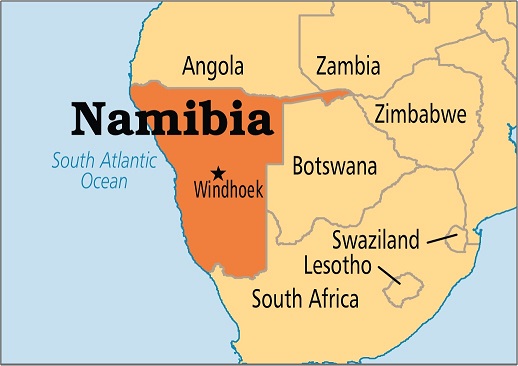By: Modupe Adeniyi. Freelance Health Reporter

Map showing the location of Namibia in Southern Africa
WEDNESDAY, MAY 08, 2024. Namibia has set a remarkable precedent by becoming the first African country to eliminate mother-to-child transmission of HIV and viral hepatitis B. The WHO regional director for Africa, Dr. Matshidiso Moeti says, "This is a landmark achievement by Namibia that demonstrates the life-saving possibilities of committed political leadership and an effective implementation of public health priorities."
Namibia’s location in Southern Africa, a region that has over half of the world's HIV burden makes this achievement noteworthy. With more than 200,000 people living with HIV and a distinct impact on females, the country's integrated approach to primary health care, antenatal services, child health and reproductive health services has been instrumental in this achievement.
"Namibia has met this milestone by taking a truly integrated approach to the HIV response from early on," said Etleva Kadilli, UNICEF regional director for Eastern and Southern Africa. "The country has not addressed HIV in isolation as a single disease but as part of a broader health and development agenda, encompassing maternal and child health for all. Namibia has reached mothers and their children, even in the most rural areas."
The World Health Organization (WHO) has awarded Namibia "silver tier" status for progress on reducing hepatitis B and "bronze tier" for progress on HIV, recognizing the country's concerted strategy to curb the transmission of Hepatitis B, HIV and syphilis. This validation process led by WHO in collaboration with UNICEF, UNAIDS and UNFPA, evaluates data and standardizes milestones for eliminating diseases.
Namibia's journey towards this milestone began with the establishment of the National Elimination Strategy in 2014, followed by the National Roadmap to Elimination of HIV and syphilis in 2020, with viral Hepatitis B added later. Widely accessible health programs and free clinical services have been pivotal in Namibia achieving this remarkable feat.
As Anne Githuku-Shongwe, UNAIDS regional director for East and Southern Africa, eloquently stated, "Namibia has fought against this injustice and we are proud to celebrate their immense effort to leave no child behind. They serve as a beacon for the entire region."
Namibia's inspiring success shows other nations striving to eliminate vertical transmission of HIV, hepatitis B and syphilis that it is possible. By prioritizing access to quality healthcare for all, Namibia sets the pace for the rest of the world to follow.
Source: World Health Organization Newsroom.
Related: The Current State of HIV/AIDS Prevention and Care in Nigeria
Published: May 08, 2024
© 2024. Datelinehealth Africa Inc. All rights reserved.
Permission is given to copy, use and share content for non-commercial purposes without alteration or modification and subject to source attribution.
DATELINEHEALTH AFRICA INC., is a digital publisher for informational and educational purposes and does not offer personal medical care and advice. If you have a medical problem needing routine or emergency attention, call your doctor or local emergency services immediately, or visit the nearest emergency room or the nearest hospital. You should consult your professional healthcare provider before starting any nutrition, diet, exercise, fitness, medical or wellness program mentioned or referenced in the DatelinehealthAfrica website. Click here for more disclaimer notice.